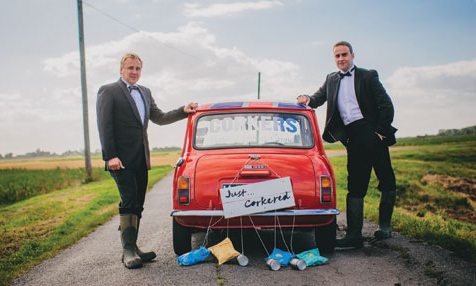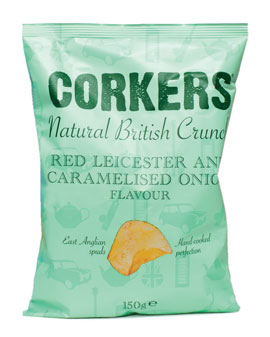How a potato farm found a successful market in posh crisps

Farm succession was the reason why the son of a potato grower looked into ways to diversify the arable business. Ross Taylor explored several ideas before he and a business partner went into the crisp production business.
We find out how he went about expanding the business, how hard lessons were learned, how Britishness was a unique selling-point for their product and how Corkers crisps have found their way onto the shelves of upmarket retailers.
See also: Spud vending machine diversification proves critics wrong
Business idea
Ross Taylor grew up on his 200ha family farm in the Fens growing potatoes and onions.
He had always had a business brain, and at 17 he began a refrigerated van business with one van; eventually he had 50 vehicles. He sold the business in 2007 to come back to the farm in Cambridgeshire, which has been in the Taylor family since the 1800s.
Mr Taylor had been looking for a market for potatoes from the farm for some time. His father wanted to retire, but Mr Taylor didn’t want to take over the business without better prospects.
“The potato market was terrible,” he says. “I wasn’t in the family business at the time but I knew if I was going to take it over I needed a way of adding value and creating a secure customer base.”
He developed his idea for up-market potato chips with childhood friend Rod Garnham, who became his business partner. However, the idea did not hit them straight away – initially they had wanted to sell washed, bagged potatoes and invested around £50,000 in equipment and branding.

Ross Taylor and Rod Garnham
Having spent the money, it was disappointing for the partners to discover they had difficulty attracting buyers. “We set up a packing plant but spent 12 months trying to find a market,” says Mr Taylor. “It was the recession and people didn’t seem willing to take on a new idea.”
Going upmarket
He admits they made mistakes in launching the venture but the experience taught them a lot, he says. “Be sure you have a product people will buy before you spend any money – we learned this the hard way.”
Although still confident they could use the experience they had gained in branding to develop a product with a longer shelf-life, they didn’t come up with the idea for upmarket crisps until they went away on holiday.
“We were on an Austrian ski slope,” says Mr Taylor. “We had a packet of crisps that were just horrendous and thought we ought to try crisps.”
The concept was simple, but after failing to get their previous enterprise off the ground when focusing initially on branding, the pair wanted to go about it the right way, by starting with the product.
When it came to perfecting the crisps, the key was attention to detail – something Mr Taylor and Mr Garnham now regard as the main constituent of their success.
The family already supplied potatoes to the chipping industry for fish and chips in Scotland and Ireland, so they knew their potatoes fried well.
Business facts
- As well as the 150g and 40g packets, Corkers was the first crisp brand to launch a 20g bag, which is fewer than 100 calories.
- There are six flavours – sea salt, sea salt and black pepper, sea salt and cider vinegar, pork sausage and English mustard, red Leicester and caramelised onion and Thai sweet chilli.
- In 2011, Corkers won the Gold Great Taste Award for the sea salt and black pepper flavour.
- The plant recycles sunflower oil and reuses the potato crates to make point-of-sale stands. The potatoes are Red Tractor assured and paper, plastics and food waste are also recycled, adding to the brand’s green credentials.
- The factory currently produces about 100,000 packets per week but is capable of producing 300,000 bags of crisps a day.
- Corkers website
While the Naturalo potato grown for many years on the Taylors’ farm is not a familiar sight on supermarket shelves because it is “uglier” than other types, it is excellent for frying due to its comparatively low sugar content.
After frying a number of samples they created what they thought was a distinctive product. The white skin of the Naturalo makes the crisp less greasy, say the founders, and the potato is sliced thinner than other brands to make it less abrasive.
Market research
Market research was invaluable in finalising the end product, including the branding, which changed considerably from Mr Taylor’s and Mr Garnham’s original idea.

“We were pleased the product didn’t need to change,” he says. “But the packaging concept changed completely.”
They discovered that people liked “Britishness”, which fitted well with the ethos of the business and was incorporated into the packaging but, crucially, the research gave them an idea of where to put the product in the marketplace.
Despite believing their product would be a success, the pair would never have predicted that their first order would come from luxury department store Harvey Nichols.
By chance, they were offered a stall at a trade fair. They took along samples and packaging concepts, having yet to produce the final packets, and were picked up by a number of retailers.
First orders
“We knew we were on to a good thing when we got our first order from Harvey Nichols,” says Mr Taylor. “But it only became real when we ordered the packaging.”
When it came to producing the orders, they already had washing and bagging equipment from their previous venture, which reduced the investment they had to make in the crisp business, says Mr Garnham. To date, they have invested a further £1m.*
The most important part of growing the business was securing the best staff, and they now employ about 30 people. “Without a doubt part of our success is down to the fantastic team we have behind us,” he admits.
Very much a local business that is growing, Corkers has two van drivers that distribute the product locally and use couriers to deliver orders worldwide.
About half of the farm’s 60ha of potatoes go into crisp production.
Supporting British farmers
One of the other themes of Corkers’ branding is supporting British farmers – something Mr Taylor and Mr Garnham are passionate about.
As the facility is based on farm, the potatoes do not have to be transported far, reducing costs and time. This is also a big draw for consumers as they are becoming more aware of food miles and the environmental impact of food, say the duo.
After nine months, Corkers was making a profit and 2012 saw turnover double, says Mr Garnham, after investment in a new factory with the potential to produce 300,000 packets a day.
With the ability to produce such large volumes, many would be looking to get their product on to the major supermarkets’ shelves. However, Mr Taylor and Mr Garnham have never had any desire to supply big retailers.
“We wanted to have a business that had hundreds of customers because supermarkets can pull the rug from under you and leave you in trouble. It’s a hard way of doing it but it gives the business strength.”
A marketing expert’s top tips
Marketing consultant John McRae says market research is a major aspect of brand creation that many new businesses ignore in their eagerness to find buyers.
“Too many people launch products thinking they know what people want,” says Mr McRae. “Deciding on your core market is important to make sure you are pitching the product in the right place and market research is an important part of this.”
- Branding should reflect the identity of the business. A brand is like the heart, soul, passion, DNA of the business. Branding is a stylisation of this – just as what a person wears reflects their personality.
- Another key component of branding is differentiation. When you think back to what the word “brand” originally meant, a brand was used by cattle farmers to distinguish their cattle from those of their next door neighbour.
- Pitching the product in the right place is also essential. Think of it as an analogy of archery. First you get ready, then aim, then fire. Getting ready is knowing what the product will be, aiming is targeting the product at the right market, and firing is the marketing. Many new businesses, in their excitement to get a product to market, don’t think about the target until later and end up with ready, fire, aim. Just like in a competition, where you can’t ask for your arrow back to try again, you can’t get wasted money back.
- Market research is key to knowing whether people will buy the product. Do not ask your friends and relatives, they will see how keen you are and may not want to burst your balloon.
John McRae is an independent marketing consultant
* Figures correct at the time of publishing
